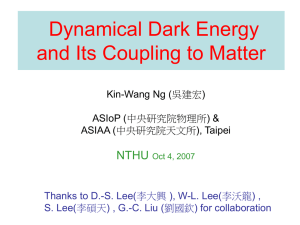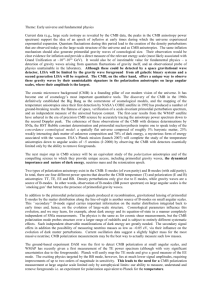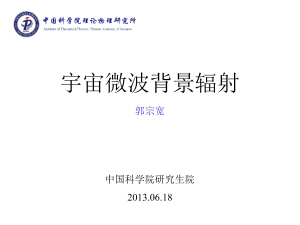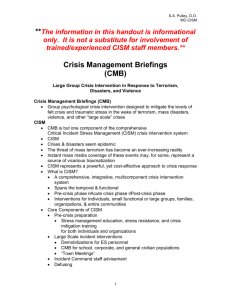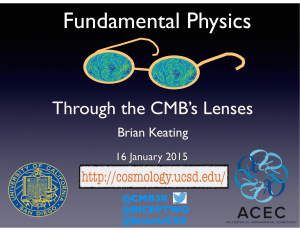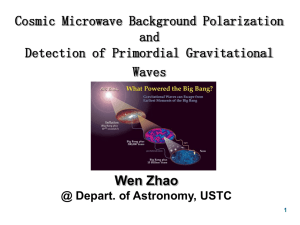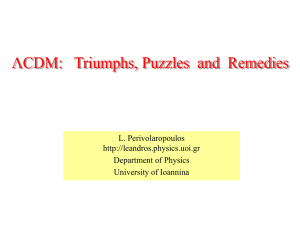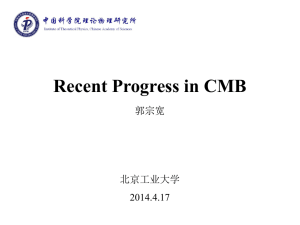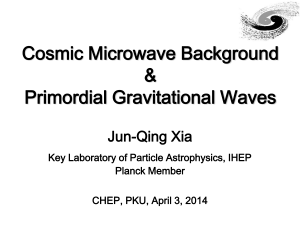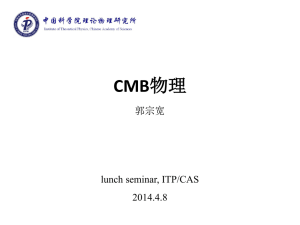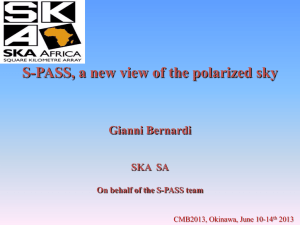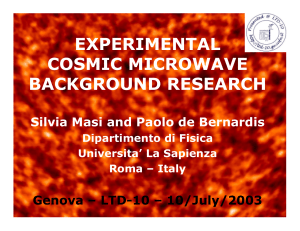PPT - Academia Sinica
advertisement
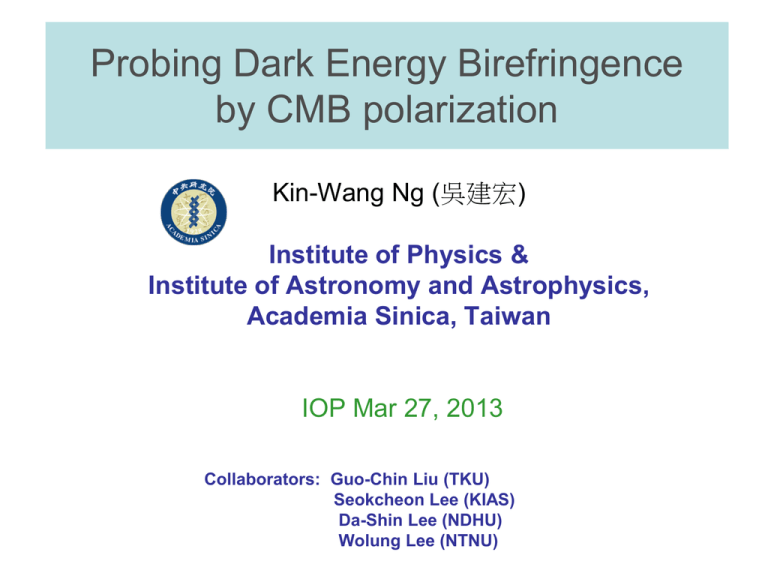
Probing Dark Energy Birefringence by CMB polarization Kin-Wang Ng (吳建宏) Institute of Physics & Institute of Astronomy and Astrophysics, Academia Sinica, Taiwan IOP Mar 27, 2013 Collaborators: Guo-Chin Liu (TKU) Seokcheon Lee (KIAS) Da-Shin Lee (NDHU) Wolung Lee (NTNU) The Hot Big Bang Model Cosmic Budget Dark Energy 70% Baryonic Matter 5% Cold Dark Matter 25% What is CDM? Weakly interacting but can gravitationally clump into halos What is DE?? Inert, smooth, anti-gravity!! Do We Really Need Dark Energy CMB /SNe /LSS Constraints on Physical State of Dark Energy Sabaru LSST JDEM EUCLID SNAP satellite Equation of State w = pDE / ρDE CMB Anisotropy and Polarization • On large angular scales, matter imhomogeneities generate gravitational redshifts • On small angular scales, acoustic oscillations in plasma on last scattering surface generate Doppler shifts • Thomson scatterings with electrons generate polarization Quadrupole anisotropy Thomson scattering e Linearly polarized CMB Measurements Point the telescope to the sky Measure CMB Stokes parameters: T = TCMB− Tmean, Q = TEW – TNS, U = TSE-NW – TSW-NE Scan the sky and make a sky map Sky map contains CMB signal, system noise, and foreground contamination including polarized galactic and extra-galactic emissions Remove foreground contamination by multi-frequency subtraction scheme Obtain the CMB sky map SKY MEASUREMENT RAW DATE MAPMAKING MULTI-FREQUENCY MAPS FOREGROUND REMOVAL CMB SKY MAP CMB Anisotropy and Polarization Angular Power Spectra Decompose the CMB sky into a sum of spherical harmonics: T(θ,φ) =Σlm alm Ylm (θ,φ) (Q − iU) (θ,φ) =Σlm a2,lm 2Ylm (θ,φ) (Q + iU) (θ,φ) =Σlm a-2,lm -2Ylm (θ,φ) q CTl =Σm (a*lm alm) anisotropy power spectrum l = 180 degrees/ q CEl =Σm (a*2,lm a2,lm+ a*2,lm a-2,lm ) E-polarization power spectrum CBl =Σm (a*2,lm a2,lm − a*2,lm a-2,lm) B-polarization power spectrum CTEl = − Σm (a*lm a2,lm) TE correlation power spectrum magnetic-type electric-type (Q,U) Theoretical Predictions for CMB Power Spectra Boxes are predicted errors in future Planck mission T TE E [l(1+1) Cl/2p]1/2 • Solving the radiative transfer equation for photons with electron scatterings • Tracing the photons from the early ionized Universe through the last scattering surface to the present time • Anisotropy induced by metric perturbations • Polarization generated by photon-electron scatterings • Power spectra dependent on the cosmic evolution governed by cosmological parameters such as matter content, density fluctuations, gravitational waves, ionization history, Hubble constant, and etc. B CMB Anisotropy CTl 2013 CMB Polarization Power Spectra 2013 Best-fit 6-parameter ΛCDM model 2013 Beyond ΛCDM model Tensor/Scalar Ratio and Spectral Index 2013 ns=0.9675 and r < 0.11 (95% CL) r=Tensor/Scalar =Ph(k)/PR(k) at k0=0.05 Mpc-1 Constant w w=w0+wa z/(1+z) Observational Constraints on Dark Energy • Smooth, anti-gravitating, only clustering on very large scales in some models • SNIa (z≤2): consistent with a CDM model • CMB (z≈1100): DE=0.70, constant w=−1.7+0.5/−0.3 (Planck 13+WMAP) • Combined all: DE=0.69, constant w=−1.13+0.13/−0.14 (Planck 13+WMAP+SNe) • A cosmological constant? Not Yet! Very weak constraint on dynamical DE with a time-varying w What is Dark Energy • DE physical state is measured indirectly through its gravitational effects on cosmological evolution, but what is the nature of DE? • It is hard to imagine a realistic laboratory search for DE • Is DE coupled to matter (cold dark matter or ordinary matter)? If so, then what would be the consequences? DE as a Scalar Field kinetic energy K potential energy S= ∫d4x [f(φ) ∂μφ∂μφ/2 −V(φ)] EOS w= p/ρ= ( K-V)/(K+V) Assume a spatially homogeneous scalar field φ(t) . f(φ)=1 → K=φ2/2 → -1 < w < 1 quintessence any f(φ)→ negative K→ w < -1 phantom V(φ) A Coupling Dark Energy? • Weak equivalent principle (plus polarized ~ body) =>Einstein gravity =>φFF (Ni 77) • Spontaneous breaking of a U(1) symmetry, like axion (Frieman et al. 95, Carroll 98) • DE coupled to cold dark matter to alleviate coincidence problem (Uzan 99, Amendola 00,..) • etc Time-varying Equation of State w(z) Affect the locations of CMB acoustic peaks (Lee, Ng PRD 03) Increase <w> =0.7 =0.3 SNIa Time-averaged <w>= -0.78 Last scattering surface Redshift DE Coupling to Electromagnetism This leads to photon dispersion relation Carroll, Field, Jackiw 90 ± left/right handed η conformal time then, a rotational speed of polarization plane DE induced vacuum birefringence – Faraday rotation of CMB polarization electric-type γ CMB photon β φ TE spectrum Liu,Lee,Ng PRL 06 magnetic-type Parity violating EB,TB cross power spectra Radiative transfer equation μ=n·k, η: conformal time a: scale factor ne: e density σT: Thomson cross section Source term for polarization Faraday rotation Rotation angle Power spectra g(η): radiative transfer function ST: source term for anisotropy SP=SP(0) r=η0 -η Constraining β by CMB polarization data 2003 Flight of BOOMERANG Likelihood analysis assuming reasonable quintessence models <TB> c.l. M reduced Planck mass More stringent limits from WMAP team and QUaD team ‘09 Future search for B mode Gravitational-wave B mode mimicked by late-time quintessence evoution (z<10) Lensing B mode mimicked by early quintessence evolution CAUTION! Must check with TB and EB cross spectra Including Dark Energy Perturbation Dark energy perturbation time and space dependent rotation Perturbation induced polarization power spectra in previous quintessence models are small Interestingly, in nearly ΛCDM models (no time evolution of the mean field), birefringence generates <BB> while <TB>=<EB>=0 Dark energy perturbation with w=-1 Lee,Liu,Ng 13 Birefringence generates <BB> while <TB>=<EB>=0 B mode B mode Summary • Future observations such as SNe, lensing, galaxy survey, CMB, etc. to measure w(z) at high-z or test Einstein gravity • However, it is also important to probe the nature of DE • DE coupled to cold dark matter => effects on CMB and matter power spectra, BAO • DE coupled to photon => time variation of the fine structure constant and creation of large-scale magnetic fields at z ~ 6 • Using CMB B-mode polarization to search for DE induced vacuum birefringence - Mean field time evolution → <BB>, <TB>, <EB> - Include DE perturbation → <BB>, <TB>=<EB>=0 - This may confuse the searching for genuine B modes induced by gravitational lensing or primordial gravitational waves, so de-rotation is needed to remove vacuum birefringence effects Kamionkowski 09, Ng 10
